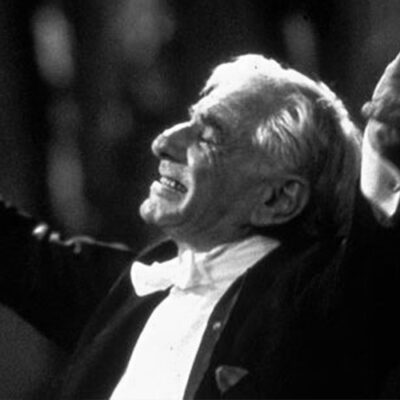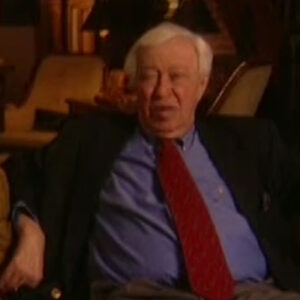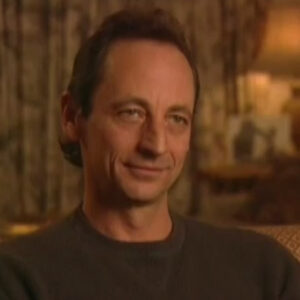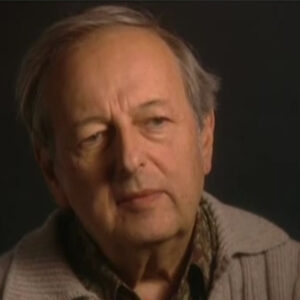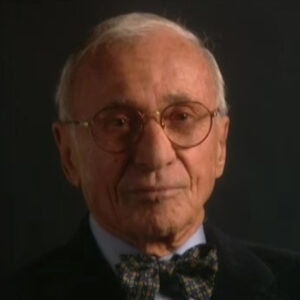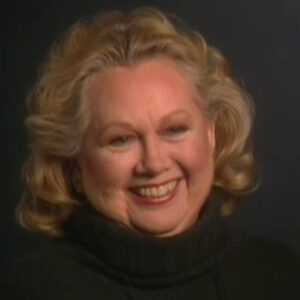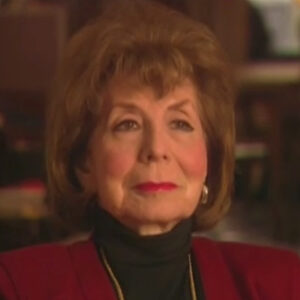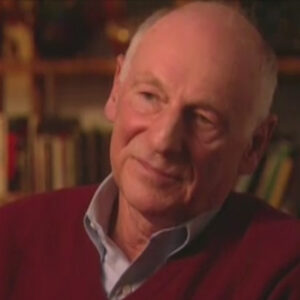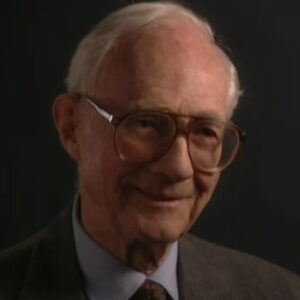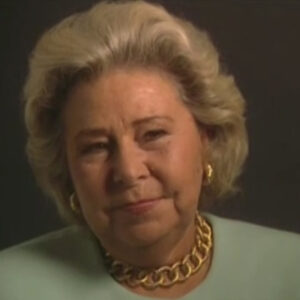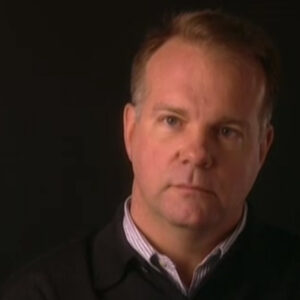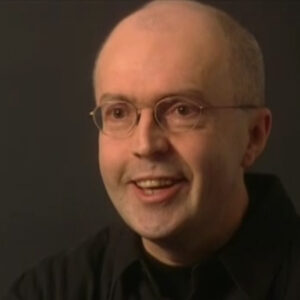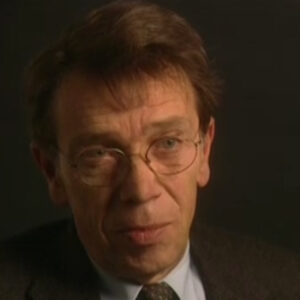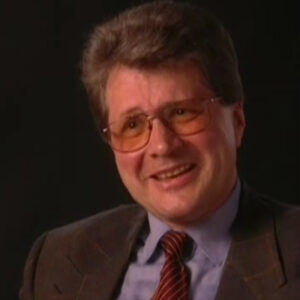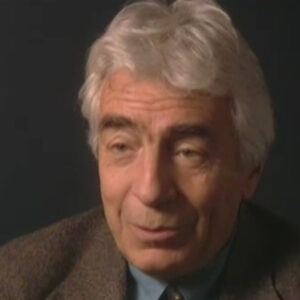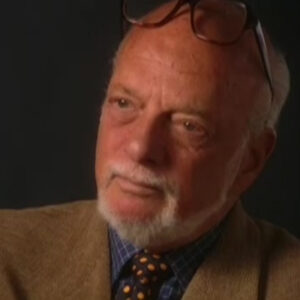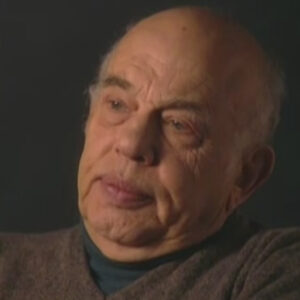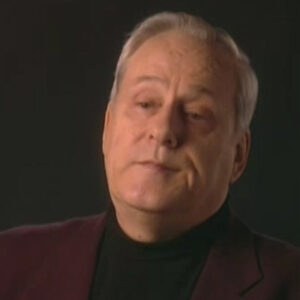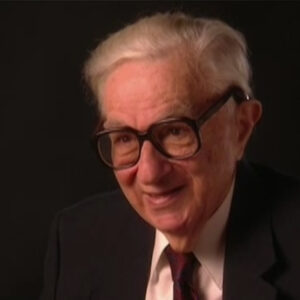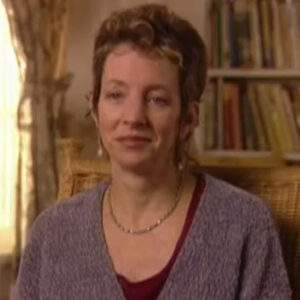Speaker Do you know I know you work there, but did you hear about his first trip to Vienna?
Speaker Yeah, this was this was this was announced very strongly in Vienna because this was the time of the Koreans exit from Vienna. And this was a time without, let’s say, great conductors, individual state opera. And this was also an important date for the Vienna Philharmonic to have a new, great, brilliant conductor, not just conducting interview in a state opera because his first is his first appearance in Vienna with our orchestras as a conductor of the orchestra of the Vienna Philharmonic of the Orchestra, Octavian, a state opera. And he was making fun stuff. And I was very young. I joined the orchestra in 65 and I was just a second clarinet player. And this time but this was and he was very famous and he was very famous in Vienna because of his music. And so this sad story and we were very, very exciting for this first appearance of the of a great conductor, of a great American musicians musician. And it was really a very exciting performance all all on stage and the orchestra. And there is a special system in Vienna. We are not playing all the rehearsals and all the performances with with with the same members of the orchestra. We are always changing. This is very important because we have a lot of work. We are playing every evening in the state opera. And so we have sometimes also have a rotation system. And then it was not used to have musicians for, let’s say for the first rehearsal, this one and for the second and then another one. But it was this was not only a rotation, this was also we want also to play. We seem to know him to see him, his his exciting way making music. And this was really fantastic. I was very young. And in this time, a young boy is more his more fire. But it was not only by us, it was was his his personality and his musicality and really his exciting way to conduct to make music and some of the first.
Speaker So this was the first time he was the first time probably most of the orchestra playing with people that had been there when he came in 1948.
Speaker I’m sure he was conducting the event.
Speaker I did not know he had a first trip in 1948. He didn’t like it. Uh huh.
Speaker Maybe this was too close to the to the end of the war and the end of the Anschluss and the Hitler time. I’m sure this is this was absolutely the problem. And for him especially. But then I’m sure let’s say not not I cannot I cannot speak for all the others colleagues, not I cannot say 100 percent, but I’m sure more than 90 percent. This was the first experience with Switzerland and playing together and there was much anticipation about it.
Speaker I as you said, because he was already famous, really?
Speaker What were the first what were the first rehearsals he was starting with with with stuff? There is there’s a short introduction. There’s no overture. So but it was so strong, strong and so brilliant. And so so it was fire. This was fantastic. Really. This was fantastic. We were used to have in this time, this was a hard time for Vienna after Karajan was going from the Vienna State Opera. And we have also this was not only problems with Vienna State Open carry on had also preferences, Vienna Philharmonic and in this time and so we have we had to have a lot of of, let’s say, boring conductors. And he was also a man of fire power. And this was the westernise, really.
Speaker Let’s talk a little bit about the Falstaff. If you could mention that the soloist was the official DKA.
Speaker There was also a very famous we made all the recordings then of this. I’m not quite sure if it was in the same year or a little later, but it was a very famous recording. And I think also now it’s one of the best first of recordings.
Speaker We made another we made other recordings in the in the in the in the in the in the next ten or fifteen years, a lot of them.
Speaker But I’m sure this is the most brilliant recording of the first really. And then when he was very young and this time it was recorded but not filmed. It was not filmed. No, no. I just just to that it was filmed say one line, that soloist with the official disco. Yeah. Yeah. That the first US did a disco and this was also a regular on stage was also I think it was I’m not quite sure his name was but not Visconti who was the who made it. There is register. I’m not quite sure. Do you know Zeffirelli. Really. Really. Oh that is Miss Sunshine. I was fantastic. Really, really. Miss Fisher disco and I do not remember all that. Godzilla’s beautiful singing. I remember not Ragle.
Speaker How did did the orchestra? Wasn’t there a bit of a kind of warming up period?
Speaker No, no, absolutely not. Absolutely. So this was just a friend of his because he was such a great musician. And this is our orchestra because it can feel in the moment, if this is a great personality, if this is a great musician, does this maybe this is a problem for some of young conductors now working with an orchestra. But we are because we are waiting for some special features, a special personality. And if this if we could watch it, if it comes in, let’s say, in 10, 15 minutes, this is OK. If not, you cannot you cannot explain. We are always telling other young conductors, don’t tell us conduct. Please make music here. We are also not telling you how to make music. We are playing music. And this is this is and this was Lenny. He was not just explaining. Sometimes he was explaining. But this is not this was not really important. He could make all with his hands and with his personality and his mixes speak language of his body, does a very good German expression for this purpose perfectly. I not under the English, but it is body language. Yeah, very good. And this is this this was this was supposed to be such a great expressive one. Very often there was no problems of the beginning. We had it did not have any of them.
Speaker I know what you say and I know it’s very difficult to describe these qualities. But when you say he was such a great musician, what are the qualities that you’re thinking of him?
Speaker I think he was trusting. He trusted always in music and in it to himself. This was this is important. This is I think he was going his way and he wants to go in this direction, not in another direction. I think this is the most important also for a young musician. If it’s a, for instance, an instrument player or a pianist or a conductor, he has to know what he wants. Absolutely. And that’s what he was quite the in the right direction.
Speaker He he has written quite a lot about his feeling, about the it and. Yeah. And he has set a record in this world. So you don’t have to say we saying that he talked about a special chemistry that he had with that, which I think you are substantial. But why why especially do you think it happened with the NFL?
Speaker I think this is that this is the same, for instance, going to Italy, you are waiting for the best line of your life, let’s say, for the for the best Sunshine or Amarant and Weidensaul or, for instance, going to to a to a desert island with a fantastic shore. You want to go swimming and to have clear and water. And so and maybe this is the reason also or drinking beer. It has to be in Slovakia. You see for instance, this is and making music maybe in Vienna. This was the I think this was the this was a great expectation for him coming to Vienna. He did know this is a great orchestra. Absolutely. Also, before he was trust, he was trusting to come to Vienna and to find a very good orchestra. And then he could feel our our musicality. I will not tell you where this is. It is difficult to say, for instance, Beaujolais or or Kiante, this is the best one of the world. And this is also difficult to tell you. Vienna Philharmonic is the best orchestra. It depends what what music you will hear and what. But what is your feeling about music and of making music?
Speaker But we are really good musicians. I’m sure. I’m sure that the great part of our orchestra are really great musicians, is a great feeling. And now also with a great instrument, they have also great instrumental qualities. Maybe not before not not for 2500 years. This was our problem, but is now absolutely much better. We we are playing better our instruments now. But the musical feeling is the same as 20 years ago or 100 years ago. This is Viennese tradition and like singing as a child, a song. And so this is this is from the milk of your mother telling in German came from our Muthoni.
Speaker What was the feeling in the city? How was Lenny treated by the people of Vienna?
Speaker He was a famous a famous man is he was not so famous conducting this time for Vienna, for the Vienna Auditorium and for the people coming to the concerts on the opera. And maybe they were sceptical a little bit because he was a famous composer and he was a great musician. We didn’t know, but but not such a great conductor. But after the first off, he was really the let’s say he was we have have some relationships also the. The public as a all the all the all the people coming to the concerts, they have relationship with him. He’s I’m sure the audience in the in the in the in the Opera House, after the after his first premiere, they were feeling this is one of our musicians and he has Lenovo’s this was he was American, but there was a great and a great Jewish tradition in him that this this is the same as let’s say, for instance, is Musella, little Olivant or Previn.
Speaker This is this day are Americans. But this is this is Vietnam. The basic is a little that not the end of the basic European music culture. And as you could feel it in, Lenovo’s also waiting. But what Vienna Philharmonic would be offering him, for instance, and not not only not only make it so make it’s changing our playing. So let’s show me what you can show me. How how do you like to to to to to to make these phrases? And he was absolutely this was a really great success.
Speaker And this was the first appearance, the first half. But then he came with his own Cavalia and Mr. Solemnis and and with Fidelia, for instance, this was always it high and higher and higher, really.
Speaker Do you have any particular stories about Rosenkavalier Rosenkavalier stories?
Speaker No, I don’t know. I don’t know. This was my first Rosenkavalier. Didn’t he do something?
Speaker I’m remembering something I read. Didn’t he make some changes?
Speaker You see, the problem is always for instance, I have to give this example. Going to talk to Napoli, for instance. You are waiting for it for the people to have to, if it’s a great temperament and to be an exciting and loud but sometimes is also in Naples. It’s not so loud and not so much temperament. And maybe this was also the not the problem, but the feeling of of making Rosenkavalier is all has to be Viennese waltz and Viennese and Viennese. And it’s not so Viennese, it’s Viennese. But he was making maybe waiting for more Viennese feeling, you see. And we are like this is like the like in Spain was with Toraya. And so maybe this was a little problem.
Speaker This could be a little problem, but. But and sometimes, for instance, or in Rosenkavalier, for us, it was too much if he was making too much Viennese music. This could be, but this was always it was always all the pieces he made oscillator, for instance, a Brahms symphony. We made Brahms in front of a TV and recorded it on these tapes and and DVDs. But all this music, that is then it then it was looking as he would composed it. Absolutely. Also, the first thing I remember is that the first symphony of Brahms, this was like a piece of him and also Rosenkavalier, this was not just conducting it was a little also composed by all the miners. But this is this is this was his personality. It was real. Real.
Speaker Let’s talk a little bit about power. That, to me, is one of the most interesting stories in my career.
Speaker Do you know the first time he came to the making of the Fifth Symphony? This was the beginning of the 70s and there was a strong earthquake. And Vienna is not a place for it. This is not Japan or San Francisco. But let’s say we have all know five, six very small earthquakes and then 30 years, 40 years, a very strong one. But we are starting and I tell you, this was my this was all I played. Also, the first time, the first planet in the in the Fifth Symphony of Mahler. And it’s starting with a trumpet solo. And we were sitting Orlinda in a music forum. And there is no there is no timpani in the beginning. Nothing, just temperature. And in the moment ever thinking what what is now because the timpani is playing. And I could not watch behind me because because that’s the organ in the music. And being a music fan is like a box. This is not like Carnegie Hall. Rome does. This is like really a box. And then I could see also that the audience is not quiet, but they are looking at this box is making. So it was a terrible feeling. This was an earthquake. And then we have to then turn it was out as we have to we have to interrupt it to make a stop over the music and then we have to start once more. But it was this was a great feeling for Lenny because he was coming to Vienna conducting the first time the Fifth Symphony of Mahler and then the earthquake. Maybe it maybe it was it was Gustav Mahler and making this earthquake, he was thinking. So did you know that he was singing maybe it’s God or Mahler or some, but this was very important, not the earthquake, but to make Mahadev is the Vienna Philharmonic. And he was complaining a little you he was complaining that there was a resistance, a little against Mahler. And this time this was maybe also political reasons. This could be also because of the Vienna Philharmonic 50 years ago, 70 years ago, during the time they did not want to play Mahler symphonies. I don’t know why. And but after learning, we all just got back from.
Speaker Wasn’t modeled by a band?
Speaker No, you see, no money was spent touring during the Anschluss, OK, but not after the after devolving between since Nevada was making a lot of Marda and all the trips was making Mahler and Bernstein and but also the last time Carol was conducting Madison resentfulness. But we have not had a special connection to Vienna Philharmonic. Not not not not my generation. I was a very young generation and this is the beginning of the 70s. But they’re the generation of my teachers. And so they have no really connection to. Maybe this was also the time and and and but after learning this is it’s common in Vienna. Absolutely. Mahler is a Vienna Philharmonic composer and beloved.
Speaker No, really, I would be so helpful if you could very concisely just kind of give me a little bit of history. Mahler had been the conductor of the Vienna theater and then he was banned by Hitler.
Speaker You know, Mahler was very rarely heard again until many of a really.
Speaker But you see my yeah, I have to tell you privately, I am of an old traditional family of Vienna Philharmonic players.
Speaker My grandfather was also playing in the orchestra first, and it was my father and my we have a special connection with Gustav Mahler. Maybe I’m not the right person to explain this case because my grandfather, a of close friends, they were together for drink, eating out and drinking. And I have also personal letters at home from Gustav Mahler for saying Don’t go to hospitals, which is a famous restaurant also now in Vienna. Don’t go there because the coffee’s not good. And don’t don’t don’t eat the beef there. It’s always too hard and it’s not good. Just just for this. I have five or six letters, but just for smoking and going out and never about anything about music or or the opera. And my dad was the director of opera and my grandfather I’m from a Polish family and my grandfather was coming from the eastern part. It’s now Ukrainian. Then what does Poland and as I know, first of all, Austria. Then it was Poland and it was the Soviet Union. Now it’s Ukraine. And after the end of the end of the century, my grandfather joined the orchestra in Prague and also Gustav Mahler hearing them him playing, and he joined him. He invited him to come to Vienna. And this was Sylvie. My my. The reason my grandfather came to Vienna was absolutely Gustav Mahler. I have another future. Gustav Mahler, you see. And also my father had and then my father joined the orchestra in the the beginning of the twenties. This was a very hard time. And after the he has to he had to leave the orchestra and he died three years later. I was born in Czechoslovakia. It was much better. And this time to to live not in a real German country. It was Germany, but in Czechoslovakia. A lot of people were living and it was easier for a non-human to to live there. And and and and so I have another feeling and another connected talk to Gustav Mahler, you see, but you can still speak for the general orchestra that Mahler was not well known.
Speaker Absolutely. Absolutely. And I’m sure I’m sure Gustav Mahler was was not quite a nice person for the orchestra. He was the director of the of the orchestra in the time of the of the of the end of the monarchy. And there are a lot of social tensions. And I’m sure he was a great composer and he could be a nice man. But I’m sure for the orchestra he was not a nice a nice director. And this I’m sure this is the problem. And then the orchestra was singing, the director’s not so nice. We do not want to play his works. This could be a reason. You see, not only this is the music is not good. This is I’m sure this is also maybe 30 percent of this is the reason for 30 percent was the reason for 30 percent of the members of the orchestra, but not for for their for their for the overwhelming part of the other musicians, I’m sure. So what happens when Lenny began to introduce Mahler and we were playing our orchestra were playing, let’s say maybe also also the Fifth Symphony. This was not the first time the Fifth Symphony of Mahler in Vienna, but just, let’s say one times and then and then five, you know, Mahler.
Speaker But now really from the beginning, from this fifth symphony of the earthquake and the beginning of the 70s, they introduced it to Vienna and to the Vienna Philharmonic. Mother was loved by all the musicians, music fans and and orchestras. All are not playing. And really a lot of mother really also into tomorrow we will play, you know, that full symphony conducted by Muti.
Speaker Did you know that the only score that was put in Lenin’s coffin when it was, uh, maybe, uh, that you might be interested? Mm hmm. So what happened when you first began with Lenny? My understanding is took a little while for it to click.
Speaker Yeah, well, I can tell me also that Lenny could not understand there’s such a famous orchestra and orchestra with such good musicians. It had some in this time could have some problems playing Mahler Symphony. And he was feeling this is this is idealogue ideology. But it was not maybe we were not used to play. This is this is really this is not so easy. This is not like to play, let’s say, a Mozart Symphony of Abraham Symphony. This is complex. It’s really a this is a very hard piece. But for instance, I tell you privately now we have also now a ballet in the Vienna State Opera. And there are some some we have there’s a performance of this music of of of Johann Strauss and also is the originator of the Fifth Symphony of Mr. Mahler. And there’s conductors conducting for the ballet because I don’t think there’s this music, but. I tell you, this is another piece, as Lenny made it in the end, for instance, for us or a really great contract. I will tell you that it’s also a great contract. It’s not possible to make you can make a Mozart symphony playing or have a piano. And to love to talk to pianist could be very nice, but embarrassing. When he was on piano, it’s not the right. You see, this is really a problem. You have to have a great orchestra and a great conductor trusting in this music. And this also in the in the sense of this music.
Speaker Now, the fifth in the 70s was not the first time in my 66, doesn’t really, but this was a common piece that there’s need for the Adibi they used to play. Absolutely. This was not the first a test. This was this was in the Orchester. This was a repertoire piece, let’s say, but not enough. Not this disinform. It’s not all. Maybe also the Second Symphony, for instance, of a mate.
Speaker And I remember very well because this was my first concert as a member of the Philharmonic in 65 doing such a big festival. And Claudio, about this was the first appearance of Cardioverter. And he was as he was in 65, I’m not quite sure, but but he was 33 or 34 and he was conducting the Second Symphony of Mahler. But this was common absolutive. The orchestra did know about the music and let’s say the second symphony. The Second Symphony, no, the first or second symphony. Then also the first of all, coming into force. But I’m sure not the six. Not not the eight or nine. I like not very much tonight, certainly very much does this the most for me. The ninth this is the most this is 100 percent matter. There’s no no Tchaikovsky in Nevada. No, no. Wagner is not. This is this is not for me. I was not into some of them have a motorcycle and think that I made a trip to the WPT in Italy. This is not about this was from Austria and he was composing this in Taubira. Tubac is not this is in the German speaking part of of Italy. The that and there is the house I was composing also this symphony and I could watch he was composing the the Ninth Symphony of of of his Ninth Symphony. It’s very exciting. Thanks. I think about making this for paint was conducted by Haitink in the same time in the same week. This was very close, very close connection to this. Interesting. If you have been ever there, you have to go there as because it really goes in. The night is the first one I heard. And did you enjoyed it? This is really the first one you could you could understand it couldn’t believe me.
Speaker It was probably can work. And I heard this because my son I heard this music and I came down like in a trance. Daddy, what is that smell or do you love that? He said, you’re young enough.
Speaker But I mean, he understood it. He always said that you had to be to really love. Not so yet.
Speaker Anyway, where we’re using let’s talk about I was I’m interested in the sixty six Mozart Piano Concerto conductor.
Speaker I can’t perform really. Can you talk about. Yeah I can’t, I can’t tell you just because watching the TV, it was now centered in TV, let’s say three or four weeks ago because I was playing, this was a lot of Mozart Piano Concerto without any clarinets and I could not, I could not remember. I was not in the concert. I did not I did not watch the concert in this time in to 66 about this. Maybe you can ask Mr. Dorotea about maybe he was you don’t you weren’t there? No, I was not there. I was not in the and I could not not learn it in the in the in the in the score.
Speaker So did you ever or did you ever perform under Leni when he was conducting and performing at the same time playing piano.
Speaker Yeah. And with that. Yeah.
Speaker You see that for for a pianist who is a conductor. This is not only Lenin, this is for instance or the Peruvian or Barenboim or so. This could be really exciting because a conductor knows all about how to make music with the orchestra as a conductor. And the pianist is waiting all this for the for the for the for the orchestra and for a good conductor. If this is both in one person, it is fantastic. And this was learned, for instance, also of the other Mozart. And he made a lot of Mozart piano concertos and not notice in 66. I don’t remember this, but, uh. Because sometimes the problem for a conductor making a solo concert, for instance, vis a vis a violin player or another pianist is he does not know the piece really. Exactly. He knows and not of the of the house to how the author, the pianist has to express how he has to wait, how to organize the orchestra together. And this is this was fantastic, wasn’t it? He has to practice piano a little bit, although it’s not quite OK. All is not 100 percent clear. But this is not it’s not so important. You see, it was for him was more important that that all together the orchestra and the piano. This is this is one complex together. And this was a very good really, but also his great personality. And he was playing fantastic piano, maybe not a not not like a brilliant pianist in the in the first three years after after after winning a competition. This is this is another case. Absolutely.
Speaker But you can you could hear that the great feeling of playing and the a great feeling to to Mozart, to music and also for the pianist. But there are a lot of now we have a lot of very good conductors playing, by the way, like Asian piano, Eschenbach is made with a group which is a good one. Good last last year we played together Mozart, Beethoven, Woodwind Quintet with piano. Fantastic. He’s a great conductor and a great pianist as Barenboim Barenboim the same. We made a concert tour last year when he was playing also first Beethoven Piano Concerto. Fantastic. Absolutely fantastic. No other conductor could conduct this because he knows about all of this, you know, to to to to to tell a lot of Kariya because he has problems.
Speaker But not this was not the problem is making music. This was the problem. He could not understand as a high musical musician, personality could, let’s say, not go with Hitler, not go with him, but not not do something again against him, that this was the problem. I’m sure Karen was not the man he is. He was he was a musician. And he wanted to make he wants he wanted to make career, but not not not. But he could also save persons because he was a strong man, also fought for this regime and other other for friends, for a lot of other German musicians. They made more for their friends and against the regime and against the administration as Karen. And this this was the problem for Lenny, because I am sure Lenny for Lenny Caron was a great conductor. Absolutely. But it was Lenny was a personality, not only conducting, conducting is OK and making music, but. There’s another way of life, another you have to to to think about the world, about peace, about people, about culture, environment, and so and this was for Karen, maybe for Karen was making music, not that other datasets. And therefore, on the other side, I have not so close connections to Karen. But it was also I made a lot of tours with Berlin Philharmonic as a substitute because Karen was not knowing me and then he was inviting me come with me because my my my first clarinetist is ill or we have he cannot play all the pieces. And and I didn’t know all about his conducting. And so and it was not a friend of Karen, but I was close to that. And but Karen told me once, tell me, Mr. Sheffield, tell me he’s making just jokes. He’s a great musician. Maybe, but why choking on stage that is not choking. You have to make music and you have to come back and say this was another way. There were different personalities, but they could be brothers. Absolutely. That is that this side and the other side, it could be there was also something similar for them because music was important for both. But there was I think that the reason they could not come together to maybe this was this for political reasons.
Speaker I’m sure they I have admired him despite the jokes.
Speaker I’m sure I’m sure both did like the other and also the interpretation. Absolutely. Maybe admiring, maybe this is too much. Maybe this is too much, but for instance, on the other way also Boom was one of them.
Speaker No, he was let’s let’s say so. He was conducting also doing the animals, also doing the the divorce time in this in Germany. And but. Lenny was admiring absolutely kalpa, really. This was interesting and also this was also not on the same political side, but he was admiring him.
Speaker Did he ever talk to you about any conflicts he may have initially felt about working with the V.A. on the beginning?
Speaker Yeah, because he he felt in the beginning, for instance, not in 66, was devastated from the air, but but was the Fifth Symphony. He felt there are some there is something strong subdiscipline against his music. He could feel it. And he was telling us that to less Jewish musicians in the orchestra, really. And this was also written in the newspaper in Austria and. This is maybe this is like making Italian music and you can then write this is a very fine orchestra, but to Les Italians in the orchestra, this is the same or French music. No French people in the orchestra, they have not the right feeling. And I’m absolutely sure, for instance, for an American orchestra, let’s say now let’s say the orchestra of of of Columbus also coming to to Vienna and playing Viennese music. You can tell they are not Viennese people. You see, this is this could be always a problem. But in this in this first performance, in this in the making of a fifth symphony of Mahler, this maybe he was right. Absolutely. There was a little. A feeling against mother from from 30, 40 percent, maybe 30 percent of the musicians, the older one, but we are not I have to tell you, this is always written on an American newspaper. This is the Vienna Philharmonic Orchestra of Nazi. This is not right. And I’m sure this is not right. This is like like going to let’s let’s say, going to Chicago. And they are all glad this is not a that is maybe five percent or three percent. This is OK, but not this is not.
Speaker So I say, oh, I’m I’m absolutely sure. I think in 1948 he felt that they were all Nazis.
Speaker Yeah, maybe. But this was too close. This is you see, this is like now going or. No, it’s better, but let’s say three or four years ago going to Moscow or to Leningrad and then you were feeling this is communism. Was there it not maybe. No, it’s better. But I was for instance, I was in Novosibirsk for four four four auditions for the Pacific Music Festival, for the four for the Academy, for the Students Orchestra. And this was in I’m not sure I think it was 93 or 94. And this is a nice city really in Siberia, but a very nice city. But I was feeling a little like in a communist city. It was not communism. Well, this is you you see the people are not changing at the moment. And and also that the buildings are not changing. And and and and this and this was the same feeling Lenny had maybe in 48 in Vienna. This was too much too close. Just too close. Um, and he was never he did not like, for instance, conducting to conduct Insight’s work, this was he conducted in such a costume festival, but such is was there the closest city to Germany? And not only because it’s really on the German border, but there’s not a reason. This was also the mentality of the people there is that they have a let’s say, a close mentality to this, to them, to this time of the of the thousand year. And and maybe this was the feeling he did not really like to to conduct and to conduct in book.
Speaker I want to talk about, um, Chris, when I asked you, were you in Berlin in 1989, did you perform when the wall came down?
Speaker No, no, no. We were not there. This was in 89. No, no, I because I, I this was the I remember I was not there.
Speaker No, no. Now you did the.
Speaker But we we we we performed in East Berlin many years ago, a year before I think it was in 87 or 86. And so this was but this was the better time also in this in 86, 87, this was also what Gorbachev was in power in Soviet Union. And so so it was also in East Berlin. It was a little better. Absolutely. But this was not a time of Olbrycht in in the in the 50s or 60s. It was the last three, four years. In the end, they did it. Day was better than 20 years ago. So it was not not really a communist feeling in this time.
Speaker We talked a little bit about Fidelio and the two hundred birthday of have, which really made a big fuss over. And you all in Vienna, you did the night and you because I have a video, we have this this was it was now centered, not the the Ninth Symphony, wasn’t it?
Speaker Not in TV in Austria. Maybe it was a two or three months ago and I’m bringing this to you. Was not born in this time. No. No one but 916. I never put it.
Speaker Thank you very. Oh I could have been waiting for you in forty eight. I would be very young. Yeah.
Speaker I could have been there but I would like to show the video, you know, in the film. So could you talk. I mean I would love some stories about fidelity.
Speaker Fidelity from Fidelity 76.
Speaker What was this was all in seventy eight. Seventy eighty. I did it. Yeah yeah yeah yeah. Maybe, maybe. Yeah. It doesn’t really matter. Just talk about fidelity. Yeah.
Speaker Because there was twice the fee data we’ve made first a performance in Vienna and this was not recorded. And then I think three or four years later it was recorded also on CD and on film and then also with this production we went to to be made it we made it to to to to to New York to not to New York.
Speaker Now to Washington. We were in Washington. In Milan. I remember now I remember now what was special about that.
Speaker What is special about.
Speaker No, this was this was this let’s say this was he learned a lot after the first this was this was not so easy for him to make the Defitelio. It was much easier, was faster for him. And I’m sure also Rosenkavalier, Fidelio is not so easy if it is really. Does this raise trade music, you see, and Lenovo’s read, his interpretation was very personal business with much feeling from inside and Fidelio is is you have to feel, but you have to first you have to absolutely make this call. And sometimes maybe this was a little problem for him because sometimes he was more important vote for him. He said he said to be correct, absolutely. But it was more important for him than to make music, to feel excitement to to to to to make joyous music as to just to to make all of this great. If you, for instance, a crescendo, let’s say one one one of half a half hour before this was not a problem for him. You can you could make it not Miss Calbert album. He told also similar discussion and out to follow this as you make it a little too early. This was not a problem, but for Vidale, this could be very important. And but on the second time and then on the second period and the second he made Fidelia, he was a little eses was changed. He learned a lot. Absolutely. Between his first Fidelia and then recorded and made it on. This is a very good Fidelia from the orchestra and from the singers. Had some problems, I hope.
Speaker Do you remember that, that one performance of Mahler’s second Leneen donated the proceeds to the Israeli Red Cross?
Speaker I do not I do not remember. I do not remember when they joined in. Yeah. Yeah. I was playing to say that this was in the Vienna State Opera.
Speaker I know. Performed and but I don’t I do not remember this. I don’t remember really.
Speaker What was it like to tour with money on ya. You see this was there in this time. Lenny was a great it was one of the greatest conductor of the world. The Vienna Philharmonic was a great orchestra. We are playing great music, Mahler. And so this was a very nice time. Now it’s much more difficult to to find the right conductors going on tour and to also to find the red did the right music. You cannot all always repeat Mozart and Beethoven symphonies and and also Mahler. You cannot always repeat. You have to find new pieces. And I tell you, the important for Lenny was not only to to to explore Mahler, the audience. And also, for instance, it’s the same with Sibelius or with Shostakovich. This was also over. And after after after he died, for instance, nobody is making more Sibelius in Vienna with an orchestra. Nobody. It’s a. Really a complaint, absolutely malice, malice performed this, really, but but Lenny, on tours, yeah. Mr. Doltish, will you tell a story about this? And on tour and I think it was in Washington or so he told me because I was asking, what stories are you telling? Because we do not want to tell the same if I tell the story and then he’s prepared for this because this year. But but but you have to do a story that you said that you and Lenny were very good friends.
Speaker I know. I know that to be the case. How did you spend time together? Did let me talk to you. Yeah.
Speaker Yeah, we we are spending also. He was explaining me a lot of, let’s say, of Mahler and Mozart. That’s for me one of the really great, great composers of our last 200 years.
Speaker And I like Beethoven very much and I like Brahms very much. Absolutely. But I admire. Marla and I, my my heart is for absolutely this is also because Mozart have a lot had composed a lot for our instrument. Maybe this is the reason. And and he could explain it was the first time I was closer to Lenovo’s in the in the 60s to 75 or so. I was 20 more than 20 years younger than now. And this was our close connection. We were sitting and he was explaining me, for instance, I never, never will forget the first symphony of Mahler, but what is necessary and what is not necessarily what would be I have to take care. And and then he was speaking a lot of me of. Also of politics and of the spotlight at the time it this and he was a friend of Canada, that this was this was his political direction. And Kreskin in Australia. And we have also a lot of of of speeches together about the part about Israel and about the problems with the Jewish people after the let’s say not not not only the last two centuries or in the last five centuries or 2000 years in the last, let’s say, in this in this in this century, because there he was also complaining. There’s a lot of of of of Eastern Europe, Jewish.
Speaker Cities and mayor, any mayor anywhere, because in Ukraine and in Minsk, in Belarusian, then the Jewish people know this, this is a lack of lack of corruption. And they’re absolutely Czernowitz, for instance, or Alembic. What this is about all together, they were slaves and and and Jewish people and and Romanians and Austrians and Germans. But they have to get over their culture. This is the same take now from New York. All the Italians and all the Spanish people, that is New York would be poor. This is a positive that this is important. And this is I think this is the problem of the century for also for Europe and for this culture. The Jewish people have now had their own state and their own country with problems. But there is a country for them. And this was the old historical city of Jerusalem, you have to understand this to. There are also other Arabs living there. This is also there have also connection with Jerusalem. I’m sure both they have to both fight. They have to both find peace not to not to make war, not this this group or not this group. And this was also Lenovo’s telling and. I don’t know if he ever had met Arafat, but he would like if Arafat would tell him, let’s let’s live with this, with the Jewish people and the Arabs in Israel or in Palestine are together. This is this was let let his sense of making peace. And and it is all it all is better than war. Absolutely. And this was also about a lot of speaking and talking about this, you know. Yeah. Yeah. We was with Lenny, although I was I was this was a relatively safe time.
Speaker This was in I’m not sure. I think it was in 88. We made a prelude fuc and this is a chess piece with him. And we were also with the Sixth Symphony of Mahler. And we were we were playing in Jerusalem and in Tel Aviv. And. This was you could stay in Jerusalem and I was in Bethlehem, for instance, and we were also Islan in Bethlehem and this time.
Speaker And it was possible I would be not possible, for instance, was there any controversy about the Vienna settlement going?
Speaker No, no, I tell you sometimes less controversy than in the United States. Well, we have had some problems with our two of us, Carolyn. I think it was in eighty nine or eighty nine nine. He died at 88. And we were having in New York these kind of problems because they they were asking, why do you come with carry on, carry us has blood on his hands. But this was not so sure.
Speaker Did you. You had obviously a very special relationship. You personally in the orchestra with Lenny, and he had relationships with the New York Philharmonic and also Israel. Did you ever feel any kind of sibling rivalry with you?
Speaker No, no, no. I’m sure there was no. No, he did. No, no, I don’t. I do not think so. I don’t think so.
Speaker Because, for instance, also, I have to tell you this example, because Karen was chief conductor of Berlin Philharmonic until the end of his life. They had the Berlin and Current. They had problems together. And he was coming back to Vienna and making a lot with our orchestra and going on tours and recordings. And so but you see, we we we are not. No, we felt all this moves all of us, Berlin Philharmonic, before and after, there was no new reality.
Speaker And so the time I didn’t ever feel about from from from, let’s say from Providence, from from New York Philharmonic to Vienna Philharmonic or from North or from ESADE. No.
Speaker And also and on the other side, no, they just sometimes were a little jealous, you know, if I had that impression.
Speaker Yeah, but but you see all the great conductors now, they are conducting all the orchestras, for instance, I tell you now is Simon Rattle is such a great conductor and he was conducting Vienna Philharmonic last week, two weeks or two weeks ago. And in the same week, he was also conducting in Vienna his city of Birmingham Orchestra, which is normal now because it’s like a singer cannot sing, Pavarotti cannot sing just a matter of in a state of Scollard singing. He said, why just this times? Times have changed. Absolutely.
Speaker This was very difficult to work with live then in the recording studio?
Speaker No, I’m sure this is also the recording studio was a life was like for him because it was always sitting, some sitting in the communist, visiting the people or or he could not make recordings in a real studio. Never. Never. There was no he we were always making recordings live, recording all the last. If we made recording such a gramophone, you can always there’s always waiting for life recording. And this was not just one life recording we recorded. For instance, I tell you my mother clarinet concerto in a concerto. There were three performances and three performances. You they took all it, but this was three live performances and this was not one life recording, you see. And we make some sometimes we did make some also retakes. But also although this was with this auditorium full. This is more atmosphere for him. He couldn’t. This was not or was not possible for him to make small pieces to pass, he had to pass. Then he told me that this is absolutely not not possible. Let’s start from a let’s go to see but not three bars before the B and then let’s go to five bars after Beedis could not. There is no sense that this is that there was no music music to phrase. This is I think the gist of it or the other thing is to make really just recordings like Shorty, Shorty, also Shorty could make just a horrible.
Speaker But between they’re not good recordings. Sam, what’s your fondest memory of Lenny?
Speaker Now, yeah, this is you see, the problem is that the greatest impression was absolutely when I was playing solo clarinet and he’s conducting it. And I tell you, I was I was joking with my colleagues because we were checking the sound in Carnegie Hall tonight, this morning for tonight. And I was remembering in 88, 87, I was checking with my planet, the sound also with Lenny and. I was feeling standing on the on the podium near there, near the first row.
Speaker It’s better than going behind just four soldiers and now it’s Muthee told. Let’s go back. It’s much, much better go back. Could be. And maybe this was the maybe this was the great take that they had this this was the greatest the highest point of my life on this on this disaster, as I am not quite sure now. But I think it was the 24th of September it because making Karnig always our across the Atlantic conducting was a clarinet concerto and have really a very good reveals really. That was very nice. We’re happy about maybe this was the highest point with him and in my life.
Speaker Did you come over to or did you participate in the memorial for many?
Speaker Yeah, we just this was in November. In November ninety. Really a group of of my orchestra, maybe 10 of M.S. or more, approximately 10. We made that devastated the remembering concert. I have all that Tahmina remember remembering concert on my wall and there was this and Thomas were conducted an Asian was conducting. This was very good because it was a mixed orchestra from from from London Symphony and from New York and from Fona from I think it was a Concertgebouw in Santa Churchillian and and Israel orchestra was this wasn’t didn’t at some point didn’t the conductor sit down and didn’t she wasn’t a conductor.
Speaker This concert.
Speaker I don’t remember. I don’t really I don’t remember now maybe. Maybe, maybe, maybe it could be maybe, but I was not playing all the pieces because there were a lot of musicians and there was there’s a rotation system. So maybe I did not play this. I remember I was playing with. With Tilson Thomas handed over to her and then was for the others, I do not remember exactly then it was then then there was a heightened sense of an invitation. But Schulman. Maybe this was also something without conducting this piece, I did not play, I’m sure I just have a few more questions, really.
Speaker I mean, Lenny.
Speaker Let he really talked about the basis of his relationship with the other and the players in the orchestra is really that you were so joined by a love of music, never known a city and an orchestra that loves music.
Speaker For instance, all this today, for instance, that we had a rehearsal was mooted and the rehearsal, it was written, the hearse was finished as one at one o’clock. And it was asking us, let’s say the last 20 minutes, it could be five minutes longer. Do you have problems with the union also or can be can be made five minutes later. And you see that the Vienna Philharmonic, we have no union. This is private. It’s like meeting chamber music, like sitting here. There’s no union now. It’s it’s five after three. You have to go. You see, we like it. And if the conductor is a great conductor, we can make all the music half an hour longer. This was exciting for Lenny, for instance. We told him. We told him why not? He asked, can can we can we play a little longer? Because I do not want to make just had a half movement and tomorrow morning the other half. Let’s make a little longer. Why not. Why not. Let’s make love. We can make not not in the evening. Not after 6:00 in the evening. Because at 7:00 sometimes the opera static we have to to go for music fans to operate. It takes five minutes. But for instance, in the morning, if the if the rehearsal ends at 1:00 or at 120, we don’t care. You see, this was exciting for him. Knew absolutely. No, this was a new. But I tell you, we make this just with a really high level conductor we love. Not with every conductor, the others. We are telling him, you have five minutes more than we have never, never was. Lenny. Absolutely no. And sometimes also the morning he was coming, you know, he was here. He likes to drink. He liked to drink whisky. Not maybe not before. I don’t know, not before the concert, but after the concert and and also and a lot of people around him on going to a party and and drinking, drinking whiskey, wine, not beer, but a lot. And sometimes also involved with him was on parties going at five to bed. And so the next morning he has to start it started. So and let’s let’s make the let’s make music.
Speaker This was the first terrible five minutes, the first five minutes. But then it was fantastic.
Speaker Then he was the music making music was like in refreshment for him, like a shower, like a cold shower. He was fresh after ten minutes. He was really bright. And not only with that music and not only with modern music, it was Brahms of it’s Mozart and bit of besides Mahler.
Speaker What do you think were his strongest skills interpretation?
Speaker I think I think it was Schumann. I think the strongest was Schumann Aftermath. Absolutely.
Speaker Mozart is Mozart was very personal personal interpretation, but Mozart is a difficult part as a tutor to make to to to to tell you this is the right Mozart interpretation. You can’t you cannot tell. But this is this is a problem with Mozart. But because Karajan was making this way boombox making.
Speaker So Abbado is making so much is making so and this could be all be all great if the conductor is a great conductor. But his special feeling was absolutely for me, Mahler, then Schumann and then on the end of his life, absolutely. Sibelius.
Speaker What about those three composers? What is the quality of the music?
Speaker Is there a connection that you think explains why many was so particularly for?
Speaker And I think the connection for Malatesta. There are similar characters, absolutely, for me from the. This is a little difficult for me not to explain in English, but this is this is maybe this is the Jewish origin. They are both composers, great musicians and. Lenny was Lenny was convinced he has to do some something for Gustav Mahler. He’s the only person who could make it, make it and he made it. Absolutely sure is. And also that compared to the style of composition and not in what is what is behind its composition, it’s not only the music, but what was Will the music express. This is this was similar from live as of of Bernsten. And. This was the close connection for the political reasons. Absolutely. And feeling we have to come together and we have to to address this was not all OK with Vienna and Vienna Philharmonic was making this Gustav Mahler. I have to to find a new and new beginning and a new way to for also for the audience or for for the world to hear.
Speaker Gustav Mahler does is this is this is a great composer and Vienna Philharmonic is a great orchestra orchestra. And this is really the right orchestra for interpretation of Gustav Mahler. I think this is the connection for Leonard and Mahler. For Schumann, this was his temperament. This was like it like Boys is going through the Asuda so long and playing with a ball. This was nice for him. This was yours and fresh. And let’s let’s drink some together. Let’s this is the French German romantic music. I think this is the connection for Schumann and for Sebelius.
Speaker Sibelius, this was he was all this was the old Lenny and he was feeling this is syphilis has a great. Intensive internal feeling inside, inside the body and inside that this was for him, I think this was important for him.
Speaker And and I it is a pity because we started to talk to to make music as a tool to to to make this music with. If we started Sebelius, we did not play a lot of Sebelius before and then Lenny died.
Speaker This is this is just the bit this was just the beginning of it. And but maybe there is also some Russian connections. Lenny was of a Jewish Russian family. Maybe this is also rebellious, but this is the Finnish and Russian. They are together roots and long, long distances. And maybe this is also this is maybe this was a rare inside feeling for for for.
Speaker What do you think Lenny will must be remembered for?
Speaker Yeah, I’m sure Lenny was the greatest musician of the second half of this century. This is he was not only the composer, he was not only the conductor. He was a great human being. And. I’m absolutely sure he was the greatest musician, maybe the and the first part of this century. This is not so easy to say because there is the late Gustav Mahler. Then we have, let’s say Stravinsky. The I do not want to forget, forget, forget anybody, anybody. But but they are not their citizenship styles, for instance. And also great conductors like Toscanini, but Lenovo’s altogether, he was a player, he was a conductor, he was making music, he was composing, and he was not just composing serious music. This was also like Mr. Story also. But I’m sure I hope we will find such a great musician in and for the next 50 years, as of between 1950 and, let’s say 1990. This was Lenny. But I hope we will find out who is the next one, because before you find a lot you can find in the 20s, you can find in the book not Brahms and Schumann and also great conductors. But but we hope we will find such a great personality, a musician and and conductor and composer and as a human being.
Speaker Is there anything you’d like to say? I didn’t ask you.
Speaker I not. I was not prepared for this. Really. So but. No, no, I hope you see maybe that maybe the only thing is that.
Speaker The widow of Mozart did an important thing in the first, let’s say, 20 years after his death, 30 years, because this was the reason Mozart is still alive.
Speaker He she made vis a vis a vis a vis medicine, his sister, her second husband, the all the letters for Mozart were very, very printed, for instance. And she made a lot of the same some pieces of it was a cut of the letters of Mozart, because this was not the picture of most of the time. And this was I think this is important was very important from that. We have to make something for Leni in the next 10 years, 20 years, because then it could be dangerous. Then you can also forget that the great personality, for instance, nobody a lot of musicians you will speak about a lot of musicians now because nobody is telling about them. Something you see, and this is let’s make something for Lennon and not only in telling that they’re the people. He was a great conductor and he was a great musician. But also, let’s try to live in his style and to make to have fun making music, to make joy with making music, also for the others, also for the for the for the auditorium and for for I was wondering, for instance, that if a pop group is making a concert, there are thousands of people are making sounds. So we have to make also this is very nice. But this is I think this is this is very good. But also there are a lot of very good pieces, classical music. And I hope there will come a time we are all making.
Speaker We are also exciting hearing music and going to the concerts as as Lenny wanted to make it. And this was also this was also for Lenny. I think this was an important thing to music is not just making music. It has to make fun, joy, peace to bring the the young people together instead of of producing arms. And and he told once that the budget of the four four arms, if you take just out of this budget, one percent for for music and bring young people together, this would be really, really gorgeous. And that is absolutely match. But this is also one of the TMF. And you know about ZAPORA this is I think this is important initially because in all this Tanglewood or this is very important to do to to make and this is in the sense of Lenny and.
Speaker He was this is it’s difficult to explain in English, but he’s like a Catholic after you. Do you know what it’s for? He’s making his way with music because he was a musician.
Speaker You can make it all of his lives as a politician or as a businessman, but bring people together, make peace, and let’s let’s enjoy our life and our world and our environment. And he was a musician here. And we and I am a musician, too. And let’s make our our profit to make this was music. But maybe your profession is this to make this with with TV or movies.
Speaker And but let’s make let’s make let’s have fun together and enjoy the life.
Speaker Were you with him and were you with him when he was in Sapporo?
Speaker No, this was I, this was you see this was a problem because this is our holiday time. The only time we have vacations from the orchestra is between the 1st of July and the 20th of July. And Lenny was telling us, come with a group of Vienna Philharmonic, come to Sapporo. And and I told him, you see, this is a problem because we have just this time for holidays. Maybe next year we will come this year. It’s absolutely not. We cannot organize it. And then I have to wait to be back for such a big festival on the 20th of July. And Lenny told me, no, maybe let’s speak about next year and from the next year we will all the other way around. I said, this is not it. Last year was my HCO or 70 year in Sapporo, but this year, the last year was Leili. If I would have known this is his last year, I would have come. Absolutely. But so his life.
Speaker But his his his sense death. I think he’s in his there absolutely. Every year, every year. And he’s helping us.
Speaker I don’t know if he’s helping us out of here. Really. He was I was in love with him. Absolutely. You know.

